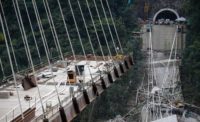ENR 2018 Top 25 Newsmakers
Michael Feigin: Multifamily Builder Launches Fire-Elimination Strategy for Wood Frames

AvalonBay’s fire-elimination strategy is being put to work on wood-framed construction like the firm’s Ava Hollywood site in California.
PHOTO COURTESY OF AVALONBAY
After fire destroyed AvalonBay’s four-story, 235-unit apartment project in Maplewood, N.J., in 2017, Michael Feigin decided that conventional industry standards and approaches designed to minimize the risks of these relatively rare, yet costly construction-phase fires were not enough.
Adopting a goal of “fire elimination,” AvalonBay’s executive vice president and chief construction officer searched for a combination of practical tools and practices that would provide a greater degree of safety, and in turn reduce the risk of human error.
Feigin likens it to buying insurance. “One element may be very effective, but do you want to risk everything on it working by itself? It’s good to have the other elements in place,” he says.

The result is a multifaceted program that combines traditional fire-suppression measures with new technologies.
Along with enhancing site-perimeter security and relocating welding, brazing and other hot-work activities off site, AvalonBay now deploys onsite sensor networks to monitor sudden temperature changes. The company also is collaborating with the developer of a specially formulated, environmentally sound fire inhibitor that can be applied easily to non-fire-retardant wood, which typically makes up about 90% of framing on a multifamily structure.
Initiated in 2018, the fire-elimination strategy has been implemented on all current AvalonBay projects, including the 690-unit Ava Hollywood in California. The additional cost for the total fire-elimination package is a national average of $1.40 per residential gross sq ft. The company continues to work with its tech partners, staff and local fire officials to refine the strategy.
Feigin is also actively sharing the AvalonBay fire-elimination approach with industry groups, real estate investment trusts and others. In November, he and AvalonBay received the Insurance Risk Management Institute’s Gary E. Bird Horizon Award, which cites efforts to improve risk management.
“A real game-changer,” is how T.J. Lyons, New York-based environmental health and safety expert and an IRMI award judge, characterizes AvalonBay’s approach. “There’s nothing else like this out there.”
Only time will tell how effective the program will be to eliminate jobsite fires where wood is the primary material.
Yet Feigin insists that even if the program is not 100% effective, a fire-elimination approach “changes the conversation” about jobsite safety, creating a different mindset.
“We’ve been willing to commit ourselves to doing this wherever we build a project,” Feigin says. “We’re all in.”



